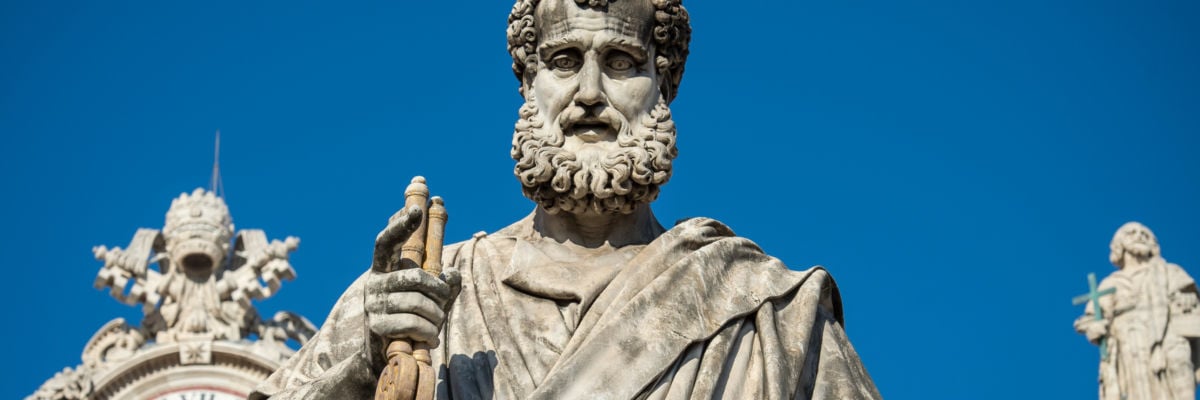
When the name Simon Peter is mentioned, we usually think of a man with many shortcomings: impulsive, prone to verbal outbursts, even one who denied the Lord! Recent portrayals imply that he mismanaged his money, couldn’t pay his taxes, and was living on the edge. He is often portrayed as a bumbling fool who constantly puts his foot in his mouth.
However, I want to present another perspective on Simon Peter. We need to look at his family and social life, his business acumen, and the qualities Jesus saw—qualities that others have often missed. I want to introduce you to Peter, the entrepreneur, the astute manager, respected and charismatic leader, and the chosen of Jesus to be the first CEO of the Church.
It’s a good idea to consider Peter’s business and community life before he ever met Jesus, because when Jesus met Peter, he immediately saw capabilities and qualities that he could build upon, making Peter the head of the most incredible and long-lasting institution ever founded: the Catholic Church. At that moment, Jesus already knew that Peter would be the foundation rock of the Church and the keeper of the keys of the kingdom (Matt. 16:18-19, John 1:42).
To understand this enigmatic man, we need to visit Bethsaida and Capernaum, where I had one of the most eye-opening experiences that helped me understand Peter. Several years ago, while walking the shores of Galilee at 5:00 A.M., I made friends with some Jewish fishermen who invited me to go fishing all night on the Sea of Galilee with them. I’d like to tell you their names were Peter and Andrew, but actually, they were Shemi and Udi.
That night, it dawned on me that I was experiencing a unique situation. I felt as though I had been transported back into the gospels 2,000 years ago, meeting the fishermen and disciples in person.
Let me set the stage. Two thousand years ago, two boys were born on the northern shore of the Sea of Galilee, to a family of fishermen in Bethsaida, which means “the House of the Fisherman.”
Each morning, they awaited their father’s fishing boat to help sort the fish and prepare them for market. Most of the fish were destined for Magdala, in another province, where the fish would be processed. Salted and smoked fish from Magdala was famous all the way to Rome and was probably multiplied later by Jesus to feed the multitudes.
These boys were learning the fishing business from their father. The rabbis were insistent that fathers teach their sons a trade. The rabbinic proverb was well known: “He who does not teach his son a trade teaches him to be a thief.”
Simon and Andrew eyed the night’s catch in the bottom of the boat. Simon (later named Peter) and Andrew had learned all the tricks of the trade from John, their father. They knew the fishing industry—the hard work, marketing and sales, handling the money, but most importantly integrity and honesty.
As they grew older, they relished the nights of fishing and the days of mending the nets and selling the fish. Before long, young Simon acquired his first boat. He was now a businessman! And it was this Simon whom Jesus met along the shore of Galilee. What did Jesus see in him that so many seem to have missed?
Was Peter a bumbling, hapless lightweight?
This is how many of us think of Peter. There are indications of his impulsiveness and outspokenness.
- Jesus once rebuked to Peter, saying, “Get behind me, Satan!”
- Peter refused to have Jesus wash his feet.
- Peter fell asleep on Jesus at the Transfiguration and at Gethsemane.
- At the Transfiguration, he said, “Let us build three booths” because “he hardly knew what he was saying.”
- Peter cut off a man’s ear with a sword in the Garden of Gethsemane.
- Peter tried to walk on water but sank. Jesus rebuked his little faith. (But remember that he was the only one who had the trust and courage to get out of the boat and try. This, I think, was why Jesus loved Peter.)
- And who can forget that Peter denied Jesus three times?
So let me ask you: if you were starting a major corporation to last through the centuries, would you have chosen Peter the fisherman as your top executive?
Jesus must have seen something in Peter . . . maybe a diamond in the rough, but also a clever businessman and an accomplished professional—the exact man to become the foundation of his Church, the royal steward of his kingdom and the CEO of his “new corporation.”
Let’s look at Peter as Jesus saw him in his native environment.
First, Peter lived in Capernaum. Why?
We know that Simon Peter and Andrew were from Bethsaida, a fishing city about ten miles north of Magdala, which was a large city of 40,000 people and the home of Mary Magdalene. They processed fish: salting, smoking, and drying.
Fish spoils quickly if not preserved. If fish were to be sold outside the immediate vicinity, it had to be processed. That is what Magdala did.
But to get their fish to the processing plant, Peter and his partners had to cross into another province! Guess who was sitting at the tax booth at the border between the provinces—Matthew the IRS agent, soon to be disciple of Jesus.
We know that Peter was a businessman with boats and partners. He calculates the yearly cost of taxes to transport his fish to Magdala and thinks, “Capernaum is an important fishing town across the border, and much closer to Magdala!”
Capernaum was perfectly situated on the Via Maris—the Way by the Sea. It had two miles of coastline and about 1,500-3,000 people. A Roman milestone displayed its prominence as a stop between Damascus all the way to Egypt and Persia.
It was a Jewish town, with its own synagogue, a tax station, and an importance so great that a Roman centurion lived there with his troops. It was a crossroads of primary importance. No wonder Jesus also chose Capernaum to be his northern headquarters for the three years of his ministry.
The Jordan River divided Bethsaida in the territory of Herod Philip, while Capernaum was on the west side and belonged to Herod Antipas. The distance between the cities is only five miles.
Peter and Andrew were careful about money, so they uprooted their families and moved to Capernaum, which gave them a huge tax break. Peter and Andrew built their newly relocated business in Capernaum and partnered with Zebedee and his sons, James and John (Luke 5:10).
Boats were not cheap! The fishing business had obstacles like bad weather, tough competition, cash flow, government regulations, times of no fish, high taxes from the Romans, etc.
As we read in the Gospels, their partnership had employees and hired laborers. In Luke 5:7, “They signaled to their partners in the other boat to come and help them. And they came and filled both the boats, so that they began to sink.” Mark 1:20 confirms this: “[Jesus] called them, and they left their father Zebedee in the boat with the hired servants and followed him.”
Peter and his partners owned fishing boats and equipment. They still had a business to return to after the Resurrection (John 21:3).
Even Pharisees knew Peter to be a businessman. For example, when taxes were owed, they came to Peter to inquire if the taxes had been paid (Matt. 17:24).
Before Jesus arrived on the scene, these guys were well on their way, riding the wave of success.
Now let’s talk about Peter’s house.
Capernaum had 1,500 citizens spread over fifteen acres, suggesting a town of 150 homes, not including other shops, the synagogue, etc.
Peter owned a nice house in Capernaum. He was now a man with resources. Peter’s living compound was large enough for multi-family dwelling: his mother-in-law, Andrew and family, Peter and family, and Jesus, and probably other disciples as well. It was a home of some prominence and importance.
The front area of Peter’s house must have been unusually spacious, since Mark informs us, “The whole city was gathered together at the door” (1:33). Jesus didn’t criticize Peter for having a spacious house—Jesus chose Peter’s larger family compound as his own dwelling.
We learn something of Peter’s good business acumen and strong community importance simply by noticing the location of Peter’s house in relation to the harbor and the synagogue. Peter’s house was only 90 feet from the synagogue and right on the harbor waterfront. In modern terms, one could say, “Like living next door to the governor!”

Peter owned a business with partners who owned their own boats and fishing gear. They hired additional employees during the high season. His home is on the main street, strategically located in the most prominent part of town. He was most likely a highly respected civic leader.

Jesus chose these businessmen, interrupting their careers just when they had peaked! He saw something in these men, even though they smelled like fish, not like books. He called them, and they left to follow him—walked away from their careers!
Jesus did not choose a bumbling fool to be his chief disciple. He loved Peter’s impulsive desire to do what was right, to take the risks, to step out from the crowd.
We are told that grace builds on nature. Jesus saw in Peter the qualities needed for leadership and decision-making. The Holy Spirit built on the character of a man Jesus named Rock. Jesus appointed him the shepherd of his flock (John 21:15-17), and Jesus chose him as royal steward of his kingdom and delegated to him the keys of the kingdom (Matt. 16:19).
It was Peter who stood up on the day of Pentecost and boldly spoke, even with the danger of death. Under the inspiration of the Holy Spirit, against all odds, Peter inaugurated the largest and longest-lasting institution in history.
Jesus saw Peter’s foibles and weaknesses—but Jesus saw a lot more than that. He saw strength, devotion, leadership, spontaneous eagerness, entrepreneurship, and management skills.
So we see a bit of the legacy of Peter, the entrepreneur, business owner, chosen by God to be the physical head and CEO of the Church—and all the popes following him are considered successors of Peter.
From a young boy learning a trade from his father on the shores of Galilee to the head of the Church, which would soon eclipse the Roman Empire itself!



